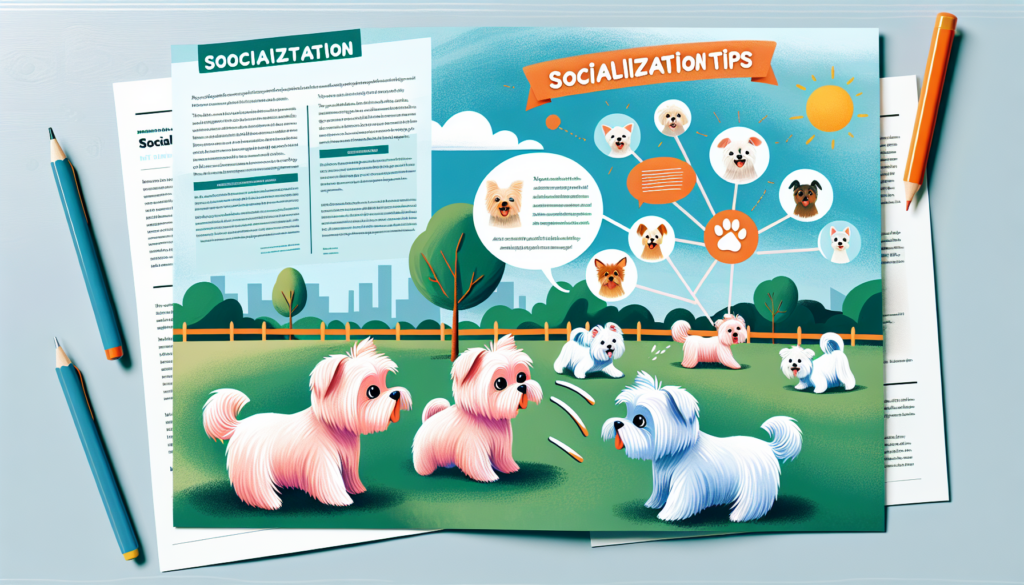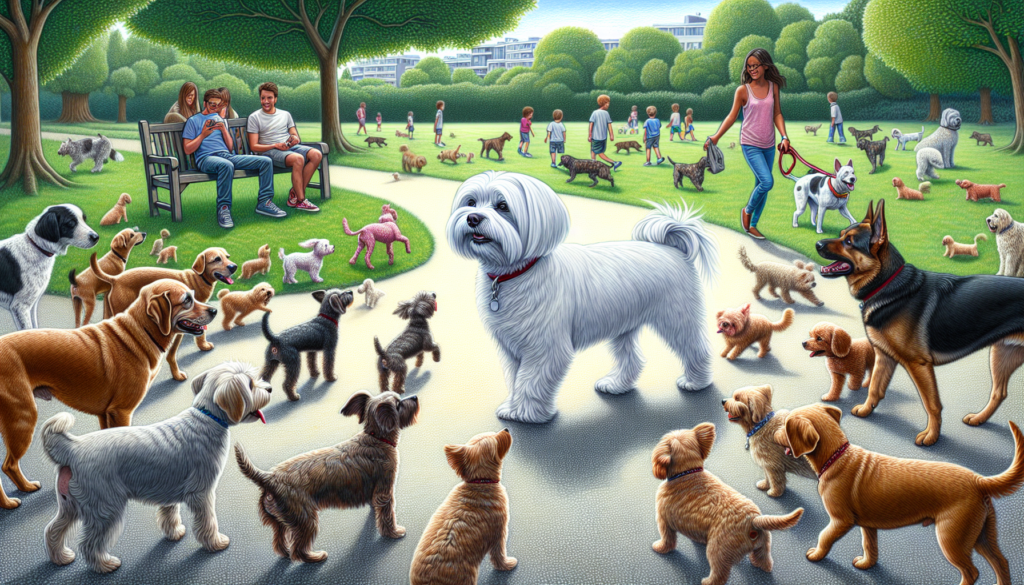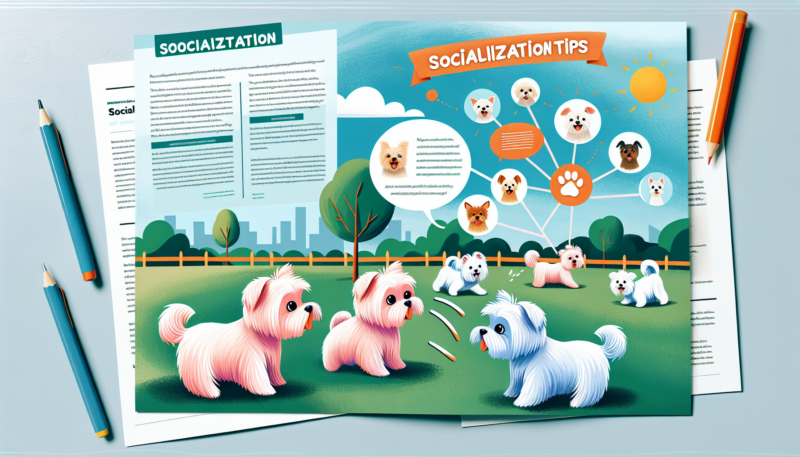If you have a Maltese dog and are looking for ways to ensure they have positive interactions with other dogs, then you’ve come to the right place. This article will provide you with valuable tips and advice on how to help your Maltese get along with other dogs. Whether you’re a first-time Maltese owner or have had them for years, these tips will help you create a harmonious environment for your furry friend and ensure that they socialize well with their canine counterparts. So, let’s dive in and discover how to make your Maltese dog a social butterfly!

Physical Introductions
Slow and Controlled Introductions
When introducing your Maltese to other dogs, it’s important to take it slow and remain in control of the situation. Begin by introducing them in a controlled environment, such as a fenced yard or a neutral space. This will help both dogs feel more comfortable and reduce the chances of any confrontations. Keep a close eye on their body language and be ready to step in if necessary.
Neutral Territory
Choosing a neutral territory for the initial meeting is crucial for a successful introduction. This can be a local park or any public space where neither dog feels possessive or territorial. Meeting on neutral ground helps to alleviate any potential tension and allows the dogs to focus on getting to know each other.
Supervised Interaction
Always supervise the interactions between your Maltese and other dogs, especially during the early stages of their relationships. This ensures that any signs of aggression or fear can be addressed promptly. Keep a leash on both dogs, but make sure they have enough space to sniff and observe each other. Stay calm and relaxed to make your Maltese feel secure and to show the other dog that everything is under control.
Socialization
Early Socialization
Early socialization is key to helping your Maltese get along with other dogs. Start introducing your puppy to different dogs, people, and environments as soon as possible. This exposure will help them develop positive associations and build their confidence. Puppy socialization classes can also provide a structured and controlled environment for your Maltese to interact with other dogs under the guidance of a professional trainer.
Positive Experiences
Create positive experiences for your Maltese during socialization. Encourage friendly interactions and reward good behavior with treats, praise, and playtime. If your Maltese starts to display any signs of anxiety or fear, redirect their attention to something positive and reassuring. Gradually increase the difficulty of the situations they encounter, always ensuring that they feel safe and supported.
Obedience Training
Obedience training plays a vital role in teaching your Maltese how to interact appropriately with other dogs. Training commands like “sit,” “stay,” and “leave it” can help redirect their focus during interactions and prevent any unwanted behaviors. Consistent and positive reinforcement helps your Maltese understand what is expected of them, enhancing their social skills and overall behavior.
Understanding Maltese Behavior
Small Dog Syndrome
Maltese dogs are prone to developing Small Dog Syndrome if not properly trained and socialized. This syndrome occurs when a small dog exhibits behavioral problems, such as excessive barking, anxiety, and resource guarding. It is essential to address and prevent this behavior by setting clear boundaries, providing consistent training, and ensuring their interactions with other dogs are positive and respectful.
Fear and Aggression
Maltese dogs, like any other breed, can exhibit fear and aggression towards other dogs if they have had negative experiences or lack socialization. Signs of fear may include cowering, trembling, or barking excessively. Aggression can manifest as growling, snapping, or even biting. Understanding these behaviors and addressing them early on is crucial for the well-being of both your Maltese and other dogs they encounter.
Communication Cues
Learning to read your Maltese’s communication cues can help you prevent and manage any potential conflicts with other dogs. Pay attention to their body language, including tail position, ear posture, and facial expressions. If your Maltese shows signs of discomfort or stress, such as a tucked tail or a stiff body, it’s important to intervene and create a more positive and relaxed environment for them.
Positive Reinforcement
Rewarding Calm Behavior
Positive reinforcement is an effective way to encourage your Maltese to exhibit calm and appropriate behavior around other dogs. Whenever your Maltese remains calm and friendly during interactions, reward them with treats, verbal praise, or a favorite toy. This positive association reinforces their good behavior, making it more likely to be repeated in the future.
Avoiding Punishment
Avoid using punishment-based methods when training and socializing your Maltese. Punishment can create fear and anxiety, potentially worsening their behavior towards other dogs. Instead, focus on redirecting their attention to desired behaviors and rewarding them for making good choices. Positive reinforcement is a much more effective and humane way to shape your Maltese’s behavior.
Consistency in Training
Consistency is key when training your Maltese to get along with other dogs. Establish clear rules and boundaries, and make sure everyone in the household follows them consistently. This helps your Maltese understand what is expected of them and reduces confusion. Consistency also applies to rewarding positive behavior and addressing any negative behaviors promptly and appropriately.

Managing Triggers
Identifying Triggers
It’s important to identify any triggers that may cause anxiety or aggression in your Maltese. This could be certain sounds, environments, or specific types of dogs. Once you’ve identified these triggers, you can take steps to manage and desensitize them to reduce their negative response. Pay attention to your Maltese’s behavior and consult with a professional if needed to develop a plan to address their triggers.
Gradual Desensitization
Desensitization is a process that involves gradually exposing your Maltese to their triggers in a controlled and positive manner. Start by introducing them to their triggers at a distance, where they can observe without feeling overwhelmed. Gradually decrease the distance over time as your Maltese becomes more comfortable and relaxed. This process should be done gradually and at your Maltese’s pace to avoid overwhelming them.
Professional Help
If you’re struggling to manage your Maltese’s triggers on your own, don’t hesitate to seek professional help. A qualified dog trainer or behaviorist can provide you with the guidance and support you need to address your Maltese’s specific triggers and develop a personalized training plan. They can also help ensure the safety and well-being of both your Maltese and other dogs they come into contact with.
Respecting Personal Space
Allowing Retreat
Respecting your Maltese’s personal space is essential for their mental and emotional well-being. Allow them to retreat or take a break from social interactions if they show signs of stress or discomfort. Create a safe space for them at home where they can relax and have some alone time. It’s important to let your Maltese choose when they want to engage with other dogs and when they need some time alone.
Avoiding Crowded Places
When out in public, be mindful of crowded places that may overwhelm your Maltese. Large gatherings or busy dog parks can be stressful for them, especially if they are not comfortable around other dogs. Opt for quieter or less crowded areas where both you and your Maltese can feel more at ease. This allows them to have positive experiences without feeling overwhelmed or anxious.
Preventing Overwhelm
Prevent overwhelming situations by gradually introducing your Maltese to new environments, people, and dogs. Start with low-stress situations and slowly increase the intensity over time. This approach allows your Maltese to build confidence and adapt to new experiences at their own pace. Remember to always observe their body language and adjust the level of exposure accordingly.
Staying Calm and Patient
Keeping Calm Energy
Dogs can pick up on their owners’ energy and emotions. When socializing your Maltese with other dogs, it’s important to stay calm and relaxed. If you feel anxious or stressed, your Maltese is more likely to mirror those emotions. Take deep breaths, maintain a positive mindset, and project a calm energy. This will help your Maltese feel more at ease and increase the chances of positive interactions.
Avoiding Frustration
It’s important to remain patient and avoid getting frustrated during the socialization process. Some dogs may require more time and effort to adjust and feel comfortable around other dogs. Understand that progress may be slow at times, and setbacks can happen. Stay committed to the training and socialization journey with your Maltese, and remember that consistency and positive reinforcement are key to success.
Time and Patience
Building positive relationships between your Maltese and other dogs takes time and patience. Every dog is unique, and they will progress at their own pace. Be understanding of your Maltese’s individual needs and emotions throughout the socialization process. Celebrate small victories and continue to provide a supportive and nurturing environment for your Maltese to flourish.
Consulting with a Professional
Dog Trainer
If you encounter challenges or have concerns about your Maltese’s behavior around other dogs, consulting with a professional dog trainer is highly recommended. A dog trainer can assess your Maltese’s behavior, provide tailored guidance, and teach you effective training techniques to improve their socialization skills. They can also offer insights into your Maltese’s specific breed traits and behaviors.
Veterinarian
If you notice any signs of fear, aggression, or anxiety in your Maltese, it’s important to consult with your veterinarian. They can rule out any underlying medical conditions that may be contributing to your Maltese’s behavior and recommend appropriate interventions. Your veterinarian can also provide advice on the best ways to manage and address any behavioral issues your Maltese may be experiencing.
Pet Behaviorist
For more complex behavioral issues, consulting with a professional pet behaviorist may be necessary. A pet behaviorist specializes in understanding and modifying animal behavior, including issues related to fear, aggression, and anxiety. They can work closely with you and your Maltese to create a comprehensive behavior modification plan and provide ongoing support throughout the process.
Educating Others
Informing Friends and Family
Educating your friends and family about your Maltese’s needs and behavior is essential for their well-being. Let them know about any triggers, fears, or specific requirements your Maltese may have when interacting with other dogs. Teach them how to approach and handle your Maltese appropriately and provide clear instructions to ensure everyone’s safety and comfort.
Using Training Tools
Training tools can be useful in managing your Maltese’s interactions with other dogs. For example, using a leash with a comfortable harness can provide you with better control during introductions and socialization. Additionally, consider using treats, interactive toys, or clickers to reinforce positive behavior and facilitate training sessions with your Maltese.
Grooming and Hygiene
Regular Grooming Practices
Maintaining regular grooming practices is not only important for your Maltese’s overall health but also plays a role in their interactions with other dogs. Regularly brush your Maltese’s coat to prevent mats and tangles, which can cause discomfort during playtime with other dogs. Keep their ears clean and nails trimmed to avoid any potential discomfort or aggression-related issues.
Cleaning After Playtime
After playtime or social interactions with other dogs, ensure that you clean up any messes or waste promptly. This demonstrates respect for the space and personal boundaries of other dogs and their owners. Cleaning up after your Maltese helps promote positive interactions and a clean environment for all involved.
Preventing Resource Guarding
Some dogs, including Maltese, may exhibit resource guarding behavior, which involves protecting their food, toys, or other valuable resources. It’s important to prevent resource guarding by following positive reinforcement techniques during feeding and playtime. This helps foster a more relaxed and cooperative attitude when your Maltese is around other dogs and reduces the risk of conflicts or aggression.
